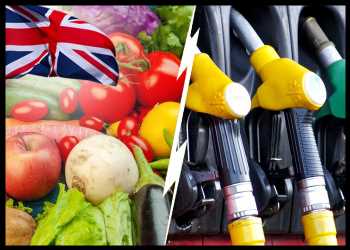Faster-than-expected slowdown took British inflation to the lowest level in two years, soothing fears of further interest rate hikes by the Bank of England and Prime Minister Rishi Sunak claimed that he has delivered on his pledge of halving price growth ahead of election next year.
Consumer price inflation eased to 4.6 percent in October from 6.7 percent in the previous month, the Office for National Statistics reported Wednesday.
The rate was the lowest since October 2021 and was weaker than the expected 4.8 percent. Despite the sharp slowdown, inflation is more than double the 2 percent target.
Excluding energy, food, alcohol and tobacco, core inflation slowed to 5.7 percent from 6.1 percent in September. The rate was below the economists’ forecast of 5.8 percent.
Halving inflation was Prime Minister Rishi Sunak’s one of the top five priorities. Inflation was above 10 percent when the former finance minister took office last year.
“In January I made halving inflation this year my top priority,”
Sunak said on the social media platform X.
“Today, we have delivered on that pledge.”
Latest figures also all but rule out a resumption of rate hikes in December, though the chances were already low, ING economist James Smith said.
Services inflation is likely to fall to the 3.5-4.0 percent level next summer and that would be a catalyst for rate cuts to begin.
While inflation will continue to fall everywhere, the restraints on labor supply as well as the stickiness of inflation expectations will mean core inflation falls more slowly in the UK, Capital Economics economist Paul Dales said.
“…the Bank won’t feel comfortable cutting interest rates until late in 2024 rather than in mid-2024 as is priced into markets“, Dales added.
The Bank of England has raised the bank rate by a cumulative 515 basis points since December 2021. In October, the central bank left the interest rate unchanged at a 15-year high of 5.25 percent.
Data today showed that housing and household services prices grew only 1.9 percent in October, reflecting downward effects from gas and electricity.
There was a slowdown in food inflation to 10.1 percent in October. Further, services inflation at 6.6 percent was below the BoE’s forecast of 6.9 percent.
Month-on-month, the consumer price index did not change after a 0.5 percent gain a month ago. Prices were forecast to rise 0.1 percent.
Separate data from the ONS showed that output prices slid 0.6 percent annually, in contrast to the 0.2 percent gain in September.
At the same time, prices edged up 0.1 percent, following a 0.6 percent rise in the previous month.
Input prices logged an annual fall of 2.6 percent, worse than September’s 2.1 percent decrease. Prices were expected to fall 3.3 percent.
Compared to the previous month, input prices moved up 0.4 percent after rising 0.6 percent, data showed.
UK house prices dropped for the first time in more than a decade in September, the ONS said in a separate report.
House prices fell 0.1 percent on a yearly basis, following a revised 0.8 percent rise in August. This represented the first annual fall since April 2012.
Source: Read Full Article
